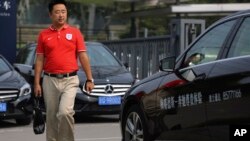Companies facing antitrust probes in China are subject to a host of pressure tactics from regulators, a business lobby said on Wednesday, in the latest report to cite due process concerns over China's anti-monopoly enforcement.
Beijing has ramped up the use of its 2008 Anti-Monopoly Law (AML) in recent years, prompting a string of complaints by foreign groups that overseas firms are unfairly being targeted by the country's three antitrust regulators.
The U.S.-China Business Council (USCBC) said companies that drew scrutiny from regulators had been pressured to “admit guilt”, appear without legal counsel and make statements without being informed of the grounds for investigations.
“Such practices contradict both the letter and the spirit of China's efforts to promote rule of law and due process, and they are out of line with international best practices,” the Council said in a report.
Reuters reported last year that companies had been warned by tough-talking regulators not to use external lawyers during probes.
China's government rejects complaints about its three antitrust regulators and says investigations by the National Development and Reform Commission (NDRC), the Ministry of Commerce, and the State Administration for Industry and Commerce (SAIC) are conducted according to law.
The Council paper follows a string of statements from the American Chamber of Commerce in China, the European Union Chamber of Commerce in China and the Washington-based U.S. Chamber of Commerce, all expressing alarm about what they have called China's unfair use of competition policy.
The Council said 86 percent of respondents to a survey reported they were either somewhat, or very, concerned about China's anti-monopoly enforcement.
Both Chinese and foreign companies had been investigated since the AML came into effect, it said, but regulators' actions “in recent months” had focused more heavily on overseas businesses.
Foreign business advocates had initially been hesitant to publicly discuss mounting concern over accusations of due process violations as investigations picked up in 2013.
But in an April letter to Secretary of State John Kerry and Treasury Secretary Jacob Lew, the U.S. Chamber of Commerce urged Washington to get tough with Beijing on its use of competition policy, which it said had been seized by China to advance its industrial agenda and nurture domestic companies.
The issue was raised at high-level strategic talks between Washington and Beijing in July.
China is trying to restructure its economy so that growth is driven by consumption and antitrust agencies have said they will target industries where practices could lead to “unreasonably” high consumer prices.
Microsoft Corp and U.S. chipmaker Qualcomm Inc are among dozens of companies scrutinized.
The NDRC, China's influential economic planner, said this year that Qualcomm was suspected of overcharging and abusing its market position in wireless communication standards, charges that could lead to fines of more than $1 billion.




